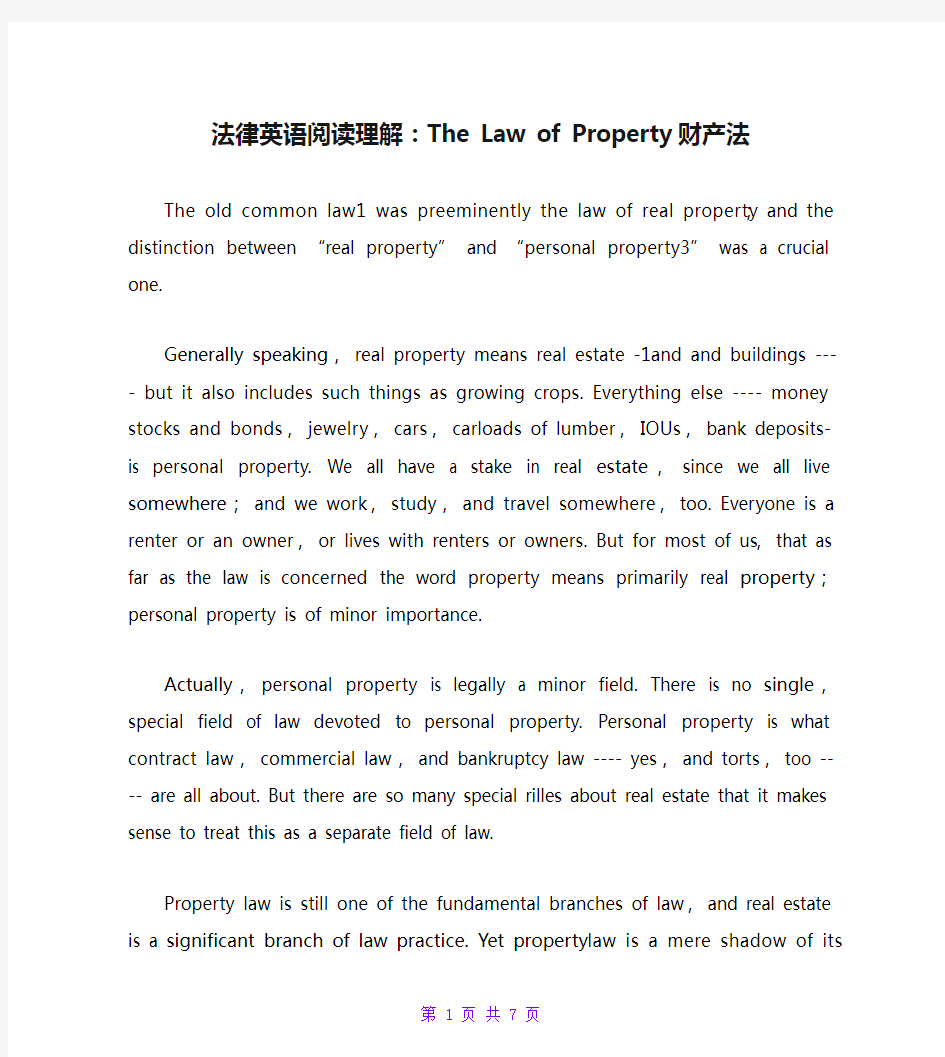法律英语阅读理解:The Law of Property财产法

- 1、下载文档前请自行甄别文档内容的完整性,平台不提供额外的编辑、内容补充、找答案等附加服务。
- 2、"仅部分预览"的文档,不可在线预览部分如存在完整性等问题,可反馈申请退款(可完整预览的文档不适用该条件!)。
- 3、如文档侵犯您的权益,请联系客服反馈,我们会尽快为您处理(人工客服工作时间:9:00-18:30)。
法律英语阅读理解:The Law of Property财
产法
The old common law1 was preeminently the law of
real property;and the distinction between “real property” and “personal property3” was a crucial one.
Generally speaking, real property means real
estate -1and and buildings ---- but it also includes such things as growing crops. Everything else ---- money, stocks and bonds, jewelry, cars, carloads
of lumber, IOUs, bank deposits- is personal property. We all have a stake in real estate, since we all live somewhere; and we work, study, and travel somewhere, too. Everyone is a renter or an owner, or lives with renters or owners. But for most of us,
that as far as the law is concerned the word property means primarily real property; personal property is
of minor importance.
Actually, personal property is legally a minor field. There is no single, special field of law devoted to personal property. Personal property is what contract law, commercial law, and bankruptcy law ---- yes, and torts, too ---- are all about. But there are so many special rilles about real estate
that it makes sense to treat this as a separate field of law.
Property law is still one of the fundamental branches of law, and real estate is a significant branch of law practice. Yet property law is a mere shadow of its former self, legal speaking. In fact,one of the major developments in our system, if you take the long view, is the relative decline of real property law. In medieval England, it would have only been a slight exaggeration to say that land law was the law of the land. When Blackstone published his “Commentaries” midway through the eighteenth century, one whole volume was devoted to land law. A modern Blackstone would shrink the topic to a fraction
of this bulk ---- 5 or 10 percent, at most, of the total law.
Medieval England lived under a feudal system. Power and jurisdiction ---- the cornerstones of wealth and position in society were based on land and land alone. The “lord” was a person who held an estate ---- a person with ownership, mastery, control over land. A person without land was a person with no real stake in affairs of state. The common law, as the royal law courts expounded it had little to say to men and women without land, who were the majority of the English population. In America, at one time, only persons who had interests in land were entitled to vote or hold office. The New York constitution of 1777, for example, restricted the right to vote for state senators to men who owned “freeholds” with $100 or more, free and clear of debt (Article X)
all this, of course, has ended; land is only one form of wealth. A great and powerful family is one
that controls mighty enterprises, rather than one
that rules vast estates.
